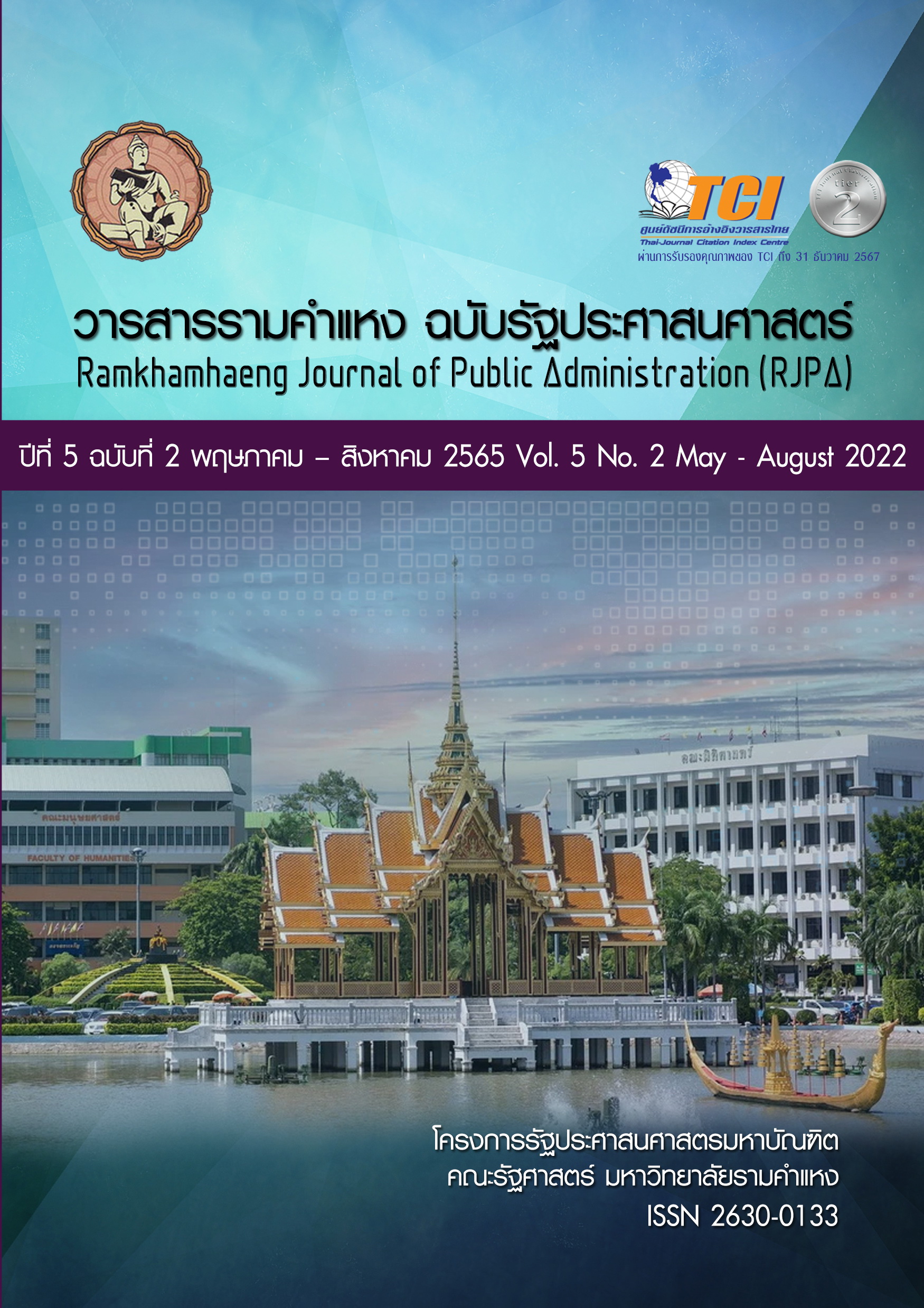Political faction in political party
A case study of Wangnamyom – Matchima - Sammit
Keywords:
Political faction, political party, Wangnamyom – Matchima – SammitAbstract
This paper resulted 1) Reasons what and how a faction exited and brought about political party instituted. 2) The administrative process of political activities of the faction and 3) What were the role and influence of the faction upon both political party-attache, and Thai political system. The methodology used in the research was qualitative methods, data collecting was drowned from documentary papers and all essential data interviewed from both of politicians and ex-politicians, including those were members or not during 2544-2562 B.E.
The results were 1) On the beginning of 2544-2549 B.E. Wangnamyom fiction had high political ambition of political power and influence upon political party-attache but the faction did not deserve the targets only expanding the political bases and deserving provincial area for the election, exchanging of ideology, and contributed political cooperation in the provincial area. Structure of political process and strong party - attache system brought about designing of 2540 B.E. constitution. 2) The years of 2550-2553 B.E., the faction then transferred to the name of Matchima and enhancing political roles for developing to be a political Party. The impacts of political situations and weak political party system in 2550 B.E. and after election in 2562, Matchima looked to be larger and looked like to get the great bargaining power but depending on 2560 B.E. constitution, it has no political power as such at all. 3) Political activity process of the faction laid on the profile of social alternative choice for the political society and identified non - conflicted body. 4) The faction had no political freedom in decision making but in political decision of elite, bureaucrat, and capital.
References
กิติมา ลิ้มประเสริฐ. (2560). แนวคิดเกี่ยวกับมัชฌิมาปฏิปทาในฐานะเป็นทางออกจากกามสุขัลลิกานุโยคและอัตตกิลมถานุโยค. วารสารสันติศึกษาปริทรรศน์ มจร, 6(ฉบับพิเศษ), 260-267.
เดอะแสตนดาร์ด. (2562). ยุบ 3 พรรคการเมือง พรรคพลังประชาชน พรรคชาติไทย และพรรคมัชฌิมาธิปไตย. สืบค้นเมื่อ 10 มกราคม 2564, จาก https://thestandard.co/onthisday02122551/
นครินทร์ เมฆไตรรัตน์. (2553). การปฎิวัติสยาม 2475. นนทบุรี: ฟ้าเดียวกัน.
นนทวุฒิ ราชกาวี. (2549). มัชฌิมาธิปไตย. สืบค้นเมื่อ 4 มกราคม 2563, จาก http://wiki.kpi.ac.th.
นิโรจน์ ขอคงประเสิรฐ. (2533). ฝักฝ่ายทางการเมือง: ศึกษากรณีการแบ่งแยกฝักฝ่ายในพรรคประชาธิปัตย์. วิทยานิพนธ์รัฐศาสตรมหาบัณฑิต, จุฬาลงกรณ์มหาวิทยาลัย
มติชนออนไลน์. (2561). กลุ่มวังน้ายม อดีตมหาอานาจในไทยรักไทย. สืบค้นเมื่อ 10 มกราคม 2564, จาก https://www.matichon.co.th/news-monitor/news_924482
สันติกะโร ภิกขุ. (2549). จงเป็นสุขเป็นสุขเถิด. กรุงเทพมหานคร: ระคังทอง.
Beller, D. C. & Belloni, F. P. (1978). Faction politics: Political parties and factionalism in comparative perspective. Santa Barbara, CA: ABC-Clio.
Köllner, P. & Basedau, M. (2005). Factionalism in political parties: An analytical framework for comparative studies. GiGA Working Paper 12. GiGA German Institute of Global and Area Studies.
Warner, C. M. (2000). Confessions of an Interest group: The Catholic church and political parties in Europe. Princeton, NJ: Princeton University Press.
ผู้ให้ข้อมูลสาคัญหลัก
ชัชชาติ สิทธิพันธุ์, อดีตรัฐมนตรีว่าการกระทรวงคมนาคม พ.ศ. 2554-2557, สัมภาษณ์ส่วนบุคคล, 28 มกราคม 2565.
ภิมุข สิมะโรจน์, อดีตสมาชิกสภาผู้แทนราษฏรพรรคไทยรักไทยปี พ.ศ. 2544-2548, สัมภาษณ์ส่วนบุคคล, 28 มกราคม 2565.
สุวิทย์ คุณกิตติ, อดีตหัวหน้าพรรคกิจสังคม อดีตรองนายกรัฐนตรี และรัฐมนตรีในรัฐบาลไทยรักไทย, พรรคเพื่อแผ่นดิน, สัมภาษณ์ส่วนบุคคล, 10 มกราคม 2565.
Downloads
Published
How to Cite
License
Copyright (c) 2025 นวภาคย์ ภัทรลีลา, นิพนธ์ โซะเฮง, เกรียงชัย ปึงประวัติ, ณัฐพงศ์ บุญเหลือ

This work is licensed under a Creative Commons Attribution-NonCommercial-NoDerivatives 4.0 International License.



